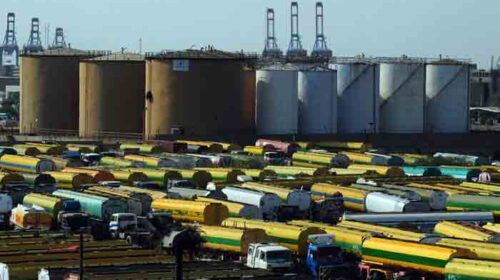All Pakistani commercial banks have refused to open letters of credit (LCs) for Russian-origin crude oil in the presence of economic sanctions by the US, the UK and EU countries against Moscow for war against Ukraine, saying the payment in US dollar terms is not possible against the import of Russian crude oil.
However, if the government manages to enter a G2G agreement with Russia for the import of crude oil under transaction mode based on the rouble, ensuring no impact of sanctions on Pakistan, the refineries can utilise crude oil up to 15-30 percent, keeping in view its technical suitability for making finished products. On the other hand, the refineries are in their short and long-term agreements with ADNOC, Aramco and KPC for crude oil imports.
More importantly, the current transportation freight for import from Russian ports is estimated in the range of $3-3.5 million compared to current freight of $0.8-1.0 from the Middle East ports and the sea voyage from the Black Sea would be around 16-26 days compared to 4-5 days from the Middle East. This means that the freight charges, from Russia’s ports to Karachi, stand at $8 per barrel which are 8-12 times higher in comparison to the UAE ports.
This is the essence of the written responses of four refineries i.e. PARCO, BYCO (Cnergyico Pk Limited), PRL and NRL to the government against letters written to them on June 27, seeking recommendations on five issues, which included technical suitability of the Russian crude oil, quality and grades, cost of transportation and freight charges, payment mechanism, and existing terms of contract.
According to the copy of the written responses available with The News, Pak-Arab Refinery (PARCO) says that a detailed technical analysis of processing Russian crude oil can be assessed on the basis of crude oil blend of Russian grades along with the current grades. The PARCO aspires to ask for samples of the Russian grades like SOKO, ESPO and URALA, and Serbia Light, saying says it can utilise Russian crude oil up to 15-30 percent keeping in view its technical suitability for making the finished products. The PARCO says at the maximum, it can import one or two cargoes of 70,000MT to process in a month as most of the Russian crude oils are heavier than its imported grades, therefore, to manage products mix, these can be processed by replacing the Arab Light crude oil.
The BYCO refinery (Cnergyico Pk Limited) in the past imported two Russian crude oil cargoes, in its recommendations and analysis on five, says the voyage time from Russian ports to Karachi varies from 28-37 days and freight charges are 8-12 times higher in comparison to the UAE ports. Since a very limited number of vessels are reporting at the Russian ports due to the risk of sanctions, this can further increase the freight charges. Cnergyico also asked Pakistan and Russian governments to decide on an effective payment channel because as per prevailing conditions, it will be difficult for commercial banks to open LCs due to the risk of sanctions. It also says that its crude procurement maintains a balance between spot and term cargoes for a particular quarter based on market fundamentals. However, the BYCO refinery says it can absorb some of the Russian crude oil.
More importantly, the Russian crude oils vary from field to field and some of them are technically suitable keeping in view of each refinery configuration. Pakistan Refinery Limited (PRL) says that it has graded three Russian crudes that include SOKOL, ESPO, and URAL. SOKOL crude oil is the first preference in terms of quality grading, ESPO second, and URAL comes third in terms of preference. While, the PRL says that SOKOL is basically a light and sweet crude, it has higher middle distillates and low fuel oil contents. SOKOL would always be the first-choice crude for PRL, when compared with other available grades.
It says that the ESPO is fairly sweeter crude with a medium-light blend. However, it’s only demerit is the higher quantum of fuel oil, and its disposal will always be a daunting task and the URAL, PRL says, it’s a mix of both heavy, light and sour crudes. Urals Sulphur content varies from 1.4 percent to 2.8 percent. Higher Sulphur content variation in this crude will naturally reflect in its product slate, thereby making it difficult for the refiner to stipulate product Sulphur specification. This crude also contains higher volumes of fuel oil and will always pose difficulties in product disposal. Mentioning transportation and freight analysis for import from Russia crude oil in comparison with the normal imports from the Middle East, the PRL says it imports a major chunk of its crude oil from the Middle East region, where freight varies between $1.0-1.5 per barrel. And Freight charges from KOZMINO port of Russia to Karachi is $8.0/barrels as quoted by the national carrier as a provisional quote. The PRL also mentions that the sea voyage time from KOZMINO port to Karachi is approximately 22 days. About the existing commitment of upliftment from the Arab Gulf region with respect to term contracts, the PRL says that according to current term contracts with ADNOC, ARAMCO and KPC 1.2 million MT/ 9.0 million barrels per year are required to be uplifted. The PRL says after fulfilling its current crude oil term, contract obligations can explore the possibility of processing an additional 300,000-400,000 MT per year.
The National Refinery Limited (NRL) in its one-page response says that currently LCs are not being confirmed by the international banks because of the country’s risk and commercial banks are not inclined to open LCs for the import of Russian crude oil in the presence of sanctions against Russia.
It also says that normal sailing time from Middle East is about 4 days, whereas it is estimated that the voyage time (one way) would be 20 days from Russia. Moreover, the route is likely to pass through war zones owing to which risk factors will increase manifold. The NRL suggested the government carve out a doable payments mechanism.







